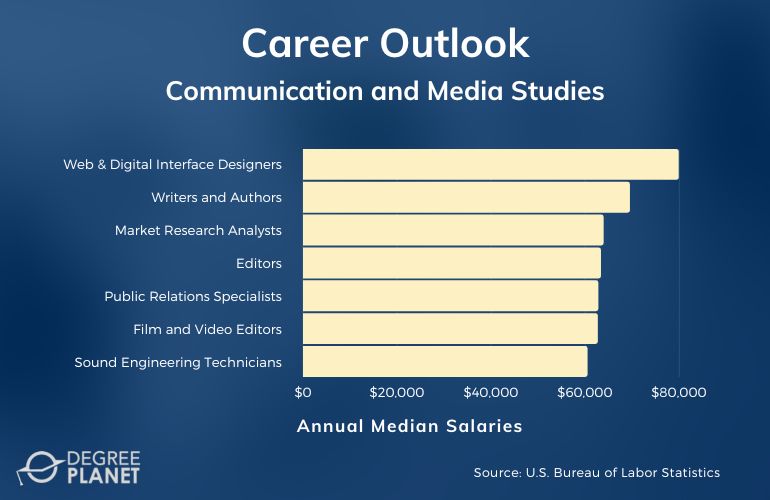A new media studies degree explores new media in the context of the digital age. This major can be useful for developing written and oral communication and critical thinking skills applicable to the media and communications field.

If you’re interested in public speaking, informing the public, writing, editing, or digital design, you may find a bachelor’s program in new media studies beneficial to your career goals.
Editorial Listing ShortCode:
You may be able to tailor the program to your specific interests by taking elective coursework that supplements the skills you want to develop for your desired field.
Online Bachelors in New Media Studies Degrees

As the digital world continues to expand, new media studies have become a common degree option for students interested in appealing to the masses.
A new media studies degree explores several aspects of the digital design and communications world. If you’re interested in creating digital media or informing or persuading the public, a new media studies program might be a good fit for you.
New media is an umbrella term that refers to any type of media that’s delivered digitally. This includes online newspaper articles, blogs, video and streaming, social media, and other forms of media used for entertainment or communication purposes.
If you’re interested in pursuing a new media studies degree, you might have the option to choose a concentration that supplements the core coursework. Concentrations give you options for what direction you want to go in terms of career paths.
Examples of concentrations typically offered in new media studies programs include:
- Journalism
- Advertising
- Digital media design
- Multimedia writing
- Public relations
Core new media studies coursework revolves around the introduction to new media theories and practices. You can learn about the influences of new media and analyze how different audiences interact with various forms of media.
Editorial Listing ShortCode:
Bachelors in new media degrees are interdisciplinary because they encompass a wide range of topics related to the digital world and communications. Skills developed throughout the program can include:
- Critical thinking
- Problem-solving
- Verbal, written, and visual communication
- Storytelling
- Research and information gathering
These skills can be applied to a range of careers in the media and communications sector. If you want to inform or persuade audiences through reporting or writing, you might consider a new media studies program that offers coursework in journalism, marketing and advertising, or digital writing.
Digital media design is another path you can take with this degree. You might consider this path if you’re more interested in developing appealing visuals for websites, advertising and marketing materials, or video or film production.
Communication and Media Studies Careers & Salaries

There are a number of directions you can take with a new media studies degree. Some graduates produce written or visual content for various media services, while others inform the public about topics of interest.
According to the Bureau of Labor Statistics, these are the annual median salaries of some media and communications careers.
| Careers | Annual Median Salaries |
| Web and Digital Interface Designers | $79,890 |
| Writers and Authors | $69,510 |
| Market Research Analysts | $63,920 |
| Editors | $63,350 |
| Public Relations Specialists | $62,800 |
| Film and Video Editors | $62,680 |
| Sound Engineering Technicians | $60,500 |
| Graphic Designers | $50,710 |
| News Analysts, Reporters, and Journalists | $48,370 |
| Desktop Publishers | $46,910 |
New media communications and design careers can be found in numerous industries. Some of the top employers include radio and television broadcasting, newspaper publishers, motion picture and video industries, educational services, and advertising and public relations services.
Editorial Listing ShortCode:
Media communications professionals may also be self-employed. Job availability and salaries can widely vary depending on your chosen industry, geographic location, level of education, and experience.
New Media Studies Bachelors Curriculum & Courses

The curriculum of a new media studies program focuses on the basic theories, practices, and applications of new media. Core and elective coursework that may be offered in this type of program include:
- Introduction to New Media Studies: This course introduces you to emerging media technologies and applications and how new media is used in different contexts.
- Introduction to Mass Media and the Digital Age: This foundational course examines the role of mass media in the digital age and its influences.
- Politics and Mass Media: You’ll learn how mass media has been used for communications in the realm of politics and news.
- New Media Research Methods: This course explores basic new media research principles and techniques to teach you how to gather information and trace it back to its original source.
- New Media Writing: You’ll learn multimedia writing skills and techniques and how to structure various forms of writing, such as journalism, print, and advertising.
- Media Ethics and Law: In this course, you’ll learn about ethical and legal issues surrounding the world of new media and mass communication.
- Digital Imaging and Online Media: You can develop digital skills in this course as you explore different computer art and design tools and techniques used for online media.
- Web Design: Design concepts, visual aesthetics, and digital design tools are studied in this course.
- Social Media Strategies: This course explores social media marketing and management techniques to help you develop skills in social media strategies.
- Digital Storytelling: This course introduces you to the basics of storytelling and explores tools and techniques used to compile information and visuals to build a story.
In this type of program, core classes focus on digital media studies, including what mass media is and how new media is used to reach mass audiences. Elective courses can help you tailor your program to fit your desired career goals.
Admissions Requirements

Admissions requirements can vary depending on the college or university, but these are some general requirements for a bachelors degree program:
- High school diploma or GED completion
- Official school transcripts
- SAT or ACT scores (only some schools require them)
- Letters of recommendation
If SAT or ACT scores are requested, institutions may use your scores when factoring in your eligibility for admission or to determine your placement level for certain general education courses.
Accreditation

The accreditation status of an institution is an important factor to consider when reviewing prospective colleges and universities.
Although it isn’t mandatory for an institution to seek regional accreditation, it provides more credibility to a college or university’s resources, faculty, and curriculum. The US Department of Education provides a list of accredited postsecondary institutions.
Editorial Listing ShortCode:
Accreditation can have an impact on a student’s financial aid eligibility, credit transfers, and employment opportunities. If you plan on pursuing an advanced degree or transferring schools, institutions may not accept transfer credits from unaccredited schools.
Financial Aid and Scholarships

You can apply for financial aid and scholarships to potentially cut down your cost of attendance or tuition. To be eligible for state or federal aid, a student must demonstrate financial need.
Federal financial aid is determined by a number of factors, such as Expected Family Contribution (EFC) and cost of tuition. You can submit a Free Application for Federal Student Aid (FAFSA) to find out if you’re eligible for federal assistance.
Scholarships are another form of financial assistance that may or may not be based on income. Students can be awarded scholarships for a number of reasons, such as specific academic interests, location, or athletic and academic merit.
You can apply for as many scholarships as you’re qualified for to potentially increase your chances of winning one or more monetary awards.
What Is a New Media Major?

A new media major is designed to introduce students to various forms of media and how they’re used to inform, persuade, or entertain mass audiences.
This program can be beneficial for those who have an interest in entering a media and communications career. Many graduates enter the field of writing, advertising or marketing, public relations, graphic design, or other similar areas.
In a new media program, you can learn about emerging media and how media is used to influence and inform others. You can develop research, analytical, and problem-solving skills as well as storytelling techniques.
What Can You Do with a Bachelor’s in New Media Studies Degree?

Since a bachelors in new media studies is a multidisciplinary program, it can be used to pursue a wide range of jobs. Potential roles in this field include editor, reporter, journalist, content writer, public relations specialist, social media director, advertising specialist, and digital strategist.
Editorial Listing ShortCode:
You could also choose to pair your new media studies degree with a concentration in digital design. This concentration can introduce you to skills and techniques used for animation, special effects, video editing, web design, and graphic design.
Some graduates also choose to continue their educations in a new media masters online or on-campus program.
How Long Does It Take to Get a New Media Studies Degree Online?

A traditional, 16-week semester bachelor’s program will usually take 4 years to complete if you attend full-time. In general, bachelors programs require students to take at least 15 credit hours per semester to be considered full-time student.
If you study part-time, it could take longer to earn your degree. On the other hand, some bachelors programs leading to online multimedia degrees offer an accelerated track. If you follow an 8-week semester program and stay continuously enrolled year-round, you may be able to finish in less time.
Is a New Media Degree Worth It?

Yes, a new media degree is worth it for many students. New media has become one of the most common ways people gain information and seek entertainment, so there’s a need for professionals with expertise in this area.
According to the Bureau of Labor Statistics, media and communications occupations are expected to see 6% job growth over the next ten years. This results in approximately 115,800 job openings in the field each year due to growth and replacement needs.
Editorial Listing ShortCode:
A new media studies degree might be a beneficial program for students who are passionate about informing others, persuading audiences, or designing visual materials for consumers.
Universities Offering Online Bachelors in New Media Studies Degree Programs
Methodology: The following school list is in alphabetical order. To be included, a college or university must be regionally accredited and offer degree programs online or in a hybrid format.

Arizona State University offers an online program for a Bachelor of Arts in Film and Media Studies. Potential classes include Race and Gender in US Media, Television Studies, and Film and Media History. This curriculum consists of 39 classes that are each 7.5 weeks long. The 120 required credits can typically be completed in 4 years of full-time attendance.
ASU is accredited by the Higher Learning Commission.

City University of New York School of Professional Studies offers a Bachelor of Arts in Communication and Media. This project aims to equip students with skills in communication, cultural awareness, creativity, and critical thinking. The program admits incoming students two times a year. All classes can be completed conveniently online.
CUNY School of Professional Studies is accredited by the Middle States Commission on Higher Education.

Eastern Oregon University offers an online bachelor’s degree program in communication studies. The degree can be completed as a Bachelor of Science or Arts depending on professional goals. On average, the program’s 180 credit hours can be completed in 4 years. Up to 135 qualifying credit hours may be transferred in from outside institutions.
Eastern Oregon University is accredited by the Northwest Commission on Colleges and Universities.

Grand Canyon University offers a Bachelor of Arts in Communications. Students who are interested in working in journalism, mass communication, or production may find a good fit in the Broadcasting and New Media concentration. Classes meet online and are typically 7 to 8 weeks long. Potential courses include Digital Media and Culture, Broadcasting and Podcasting, and Communication Ethics.
Grand Canyon University is accredited by the Higher Learning Commission.

Maharishi International University offers a Bachelor of Arts in Cinematic Arts and New Media. Classes cover topics like production technology and methods, communication strategy, and cultivating a creative process. The curriculum consists of 120 credit hours total. Classes may be completed traditionally on-campus or conveniently online.
MIU is accredited by the Higher Learning Commission.

Oregon State University offers a bachelor’s program in digital communication. Students can tailor their studies to their interests by selecting a Bachelor of Arts or Science in this discipline. The program’s 180 credit curriculum is housed entirely online. Graduates often pursue careers as film editors, postsecondary teachers, producers, or digital designers.
Oregon State University is accredited by the Northwest Commission on Colleges and Universities.

Southern New Hampshire University offers a Bachelor of Arts in Communication. This program offers concentrations in Business Communication, New Media, Professional Writing, and Public Relations. Up to 90 qualifying credits may be transferred in toward the program’s 120 required credit hours. All classes can be completed 100% online.
SNHU is accredited by the New England Commission of Higher Education, Inc.

The New School offers a bachelor’s degree program in media studies. The degree can be earned as a Bachelor of Arts or Science depending on personal career goals. Classes may be completed online or on campus, full-time or part-time. Potential courses include Video Production, Interview Methods, and Immersive Storytelling. Graduates may pursue careers in design, social media, journalism, or film.
The New School is accredited by the Middle States Commission on Higher Education.

The University of Colorado—Denver offers a Bachelor of Arts in Communication. This program aims to help students develop the skills to communicate effectively, create strong arguments, take on leadership roles, and think critically. The curriculum consists of 120 credit hours total. Classes may be attended online or in person at the Denver campus.
CU Denver is accredited by the Higher Learning Commission.

The Bachelor of Arts in Interdisciplinary Studies program at the University of Massachusetts—Amherst offers a concentration in Film and Media. The program’s convenient online learning format is designed with working adults in mind. There are three start dates offered each year in fall, spring, and summer terms. The completion of at least 120 credits is required to graduate.
The University of Massachusetts – Amherst is accredited by the New England Commission of Higher Education.
Getting Your Degree in New Media Studies Online

Much like with an online media communications degree, an online new media studies degree can introduce you to the world of mass communication. Various marketing, digital design, storytelling techniques, and social media strategies are explored in this major.
This degree can be useful for a range of media and communications occupations in journalism, public relations, writing, marketing, and related fields. A new media studies program can also help you develop versatile soft skills, such as problem-solving, critical thinking, and communication skills.
To begin your educational journey in this growing field, you can start researching accredited schools to find the online new media program that best supports your interests and goals.

